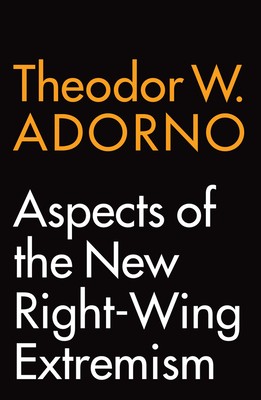
- We will send in 10–14 business days.
- Author: Theodor W Adorno
- Publisher: Polity Press
- ISBN-10: 1509541446
- ISBN-13: 9781509541447
- Format: 12.5 x 18.8 x 1 cm, kieti viršeliai
- Language: English
- SAVE -10% with code: EXTRA
Reviews
Description
On 6 April 1967, at the invitation of the Socialist Students of Austria at the University of Vienna, Theodor W. Adorno gave a lecture which is not merely of historical interest.
Against the background of the rise of the National Democratic Party of Germany, which had enjoyed remarkable electoral success in the first two years after its formation in November 1964, Adorno analysed the goals, resources and tactics of the new right-wing nationalism of this time. Contrasting it with the 'old' fascism of the Nazis, Adorno gave particular attention to the ways in which far-right movements elicited enthusiastic support in sections of the West German population, 20 years after the war had ended.
Much has changed since then, but some elements have remained the same or resurfaced in new forms, 50 years later. Adorno's penetrating analysis of the sources of right-wing radicalism is as relevant today as it was five decades ago. It is a prescient message to future generations who find themselves embroiled once again in a struggle against a resurgent nationalism and right-wing extremism.
EXTRA 10 % discount with code: EXTRA
The promotion ends in 23d.13:16:43
The discount code is valid when purchasing from 10 €. Discounts do not stack.
- Author: Theodor W Adorno
- Publisher: Polity Press
- ISBN-10: 1509541446
- ISBN-13: 9781509541447
- Format: 12.5 x 18.8 x 1 cm, kieti viršeliai
- Language: English English
On 6 April 1967, at the invitation of the Socialist Students of Austria at the University of Vienna, Theodor W. Adorno gave a lecture which is not merely of historical interest.
Against the background of the rise of the National Democratic Party of Germany, which had enjoyed remarkable electoral success in the first two years after its formation in November 1964, Adorno analysed the goals, resources and tactics of the new right-wing nationalism of this time. Contrasting it with the 'old' fascism of the Nazis, Adorno gave particular attention to the ways in which far-right movements elicited enthusiastic support in sections of the West German population, 20 years after the war had ended.
Much has changed since then, but some elements have remained the same or resurfaced in new forms, 50 years later. Adorno's penetrating analysis of the sources of right-wing radicalism is as relevant today as it was five decades ago. It is a prescient message to future generations who find themselves embroiled once again in a struggle against a resurgent nationalism and right-wing extremism.


Reviews